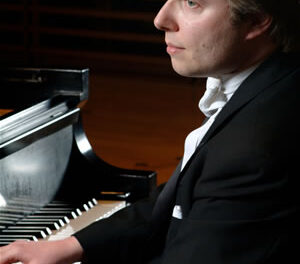What a weekend for North Carolinian classical music nerds! With multiple ambitious concerts hosted all over the state, it would have been easy to miss the lovely gem of a program presented by Duke’s Department of Music – and that’s a shame. Several local classical music celebrities, including Bonnie Thron, David Heid, Deborah Hollis, and Bill Robinson collaborated in various capacities to produce a wonderfully polished afternoon of music. Ranging from raw to graceful to flirtations, the pieces presented were delightfully rich in variety and exquisitely prepared.
First, a note on the programming. The balance between classic and adventurous was, in the Goldilocks sense, just right. The comforting, familiar Schubert sonata contrasted nicely with the more adventurous Britten solo Suite for Cello, Op. 72. The less familiar works of virtuoso/composer Gaspar Cassadó received some attention, while music by a local, living composer also shared the spotlight. The program both edified and educated the audience; learning something new while thoroughly enjoying oneself is always a treat.
Unfortunately, attendance was understandably rather sparse. Competition was stiff this weekend, with the state’s first full-length Wagner opera in Raleigh and an arts festival in Durham being held the same weekend. Despite other concurrent and interesting artistic offerings, the small but dedicated audience clearly appreciated the music and those behind it. A lot of local cellists and pianists appeared out of the woodwork in support of their colleagues; there is something special about sharing a concert experience with those who thoroughly understand what goes into putting it together.
Schubert’s Sonata for Piano and Arpeggione in A minor, D. 821 showcased Heid’s tender and warm touch. His chord voicings were exceptional; his attention to every detail of harmonic hierarchy brought out all the warmth and subtlety of Schubert’s writing. While Thron’s program notes proudly claimed this work for arpeggione – a novelty, bowed guitar-like instrument that never really caught on – as part of the cello canon, the writing is less idiomatic than other works on the program, and does not showcase the cellist quite as well as it does the pianist. However, the balance was excellent and remained so throughout the program.
It is a rare opportunity to see a work performed by the musician it was written for – even more so to hear it with the composer in attendance. Hollis joined Thron and Heid in the performance of the chamber version of Robinson’s Cello Concerto. The piece includes four movements, “Over the Stone” (Tros y Garreg), “Heart Song,” “Contradanza,” and “Schlimmbesserung.” Based on a traditional Welsh tune, the first movement stands out in its creative treatment of the folk material and in how well it shows off Thron’s characteristic technical prowess and warmth in the lower strings. Heid and Hollis interlocked nicely, taking turns in more prominent and more supporting roles. The performers continued to maintain superb balance, despite the inherent challenges of having two grand pianos playing together in a supporting role.
Thron tackled Benjamin Britten’s solo Suite for Cello, Op. 72, with a healthy dose of moxie. The piece has nine contrasting movements and requires virtuosic technique, a high level of expression, and a cooperative instrument. Alternatively meditative and snarky, the work can be a challenge to present in a relatable fashion. Thron’s rendition balanced both drama and subtlety; she allowed the emotionality of the work to take precedence over the (albeit stunning) technical fireworks.
Dessert was served in the form of Cassadó’s “Requiebros” (loosely translated as “flirtation”). Much lighter than the preceding pieces, the Spanish flair and colorful melodies rounded out the final course nicely. Following the final work, the audience demanded an encore. Frank Bridge’s “Meditation” served beautifully in that capacity.
Sunday was one of those special events in which the instrumentation and programming are perfectly suited to the performance space. The acoustics of Baldwin Auditorium enhanced the music wonderfully, enriching resonance without sacrificing clarity. Overall, this program was one of the best chamber music concerts this reviewer has attended this year. Rock solid preparation, nuanced musicianship, and thoughtful programming combined to create a truly special event. The audience was left fulfilled and inspired – a gift not to be taken lightly in election season.
As always, make sure to stay abreast of upcoming artistic offerings with our calendar.











